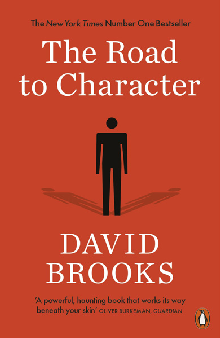The Road to Character
DAVID BROOKS
PENGUIN BOOKS, 2016
David Brooks says that he wrote this book to save his own soul (xi). As a New York Times columnist he is “paid to be a narcissistic blow-hard” who has to work hard “to avoid a life of smug superficiality” (xii). In an effort to avoid “self-satisfied moral mediocrity” he wants to clear away the overgrown road to character and try to start down it. ‘Character’ is your moral core, your capacity for responding to the needs of the world, for struggle and self-conquest, for humility and self-effacement, for maintaining dignity, for giving and receiving love, for being open to grace.
The road to character is overgrown, says Brooks, because our culture has become shallow.
We are too focussed on skills, achievement and success in the outer world, the world of wealth, knowledge, status and power. We have lost the knack of talking about the inner world, the world of wisdom, meaning and growth in the qualities of heart and soul. We have embraced ourselves, celebrating and affirming who we are, and lost an older, “crooked timber” tradition that emphasised all the ways we fall short of who we should be and how we must work to overcome who we are in order that we may be someone worth admiring or emulating, someone really integrated and mature.
Brooks opens by analysing a cultural shift in the West from values of self-effacement and modesty and a low opinion of one’s own importance (“little me”), to a “big me” moral ecology that encourages us to think that we are special, that we should trust what we find in ourselves, that the way to maturity is to unfold faithfully what we discover in our hearts, not to struggle to tame and transform it. The bulk of the book is then ten biographical chapters of figures that Brooks thinks have some moral nobility about their lives that makes them worthy for us to know and perhaps emulate in some dimension.
The subjects of the chapters are men and women, religious and secular, and their journeys along the road to character are various. There is Frances Perkins, summoned by her experience of the tragedy of the 1911 Triangle Shirtwaist Company factory fire to a life of single-minded political work in the service of workers. Tough and shrewd, she gave herself to the cause, and this sense of vocation took her to the inner circle of President Roosevelt. There is Dwight Eisenhower whose rigorous self control and moderation expressed the basic conviction that our sin gives us reason to distrust and control ourselves inwardly and outwardly. There is Dorothy Day, whose bohemian life gave way, in a conversion to Roman Catholicism, to a life of self-sacrificial service of the poor, inspired by a desire to live for God. There is George Marshall (of the Marshall Plan) who committed himself to the institution of the military, and submerged his own ego to serve those over him and what the army and the country asked him to do. There is Philip Randolph, the civil rights leader whose determined, dignified and disciplined life equipped him for the moral tasks of his moment.
Late in the book we get two interesting chapters where the direction changes from figures whose self-integration and maturity seems to come through a fair bit of choice and self-training, to figures whose self-integration and maturity comes more through things that happened to them. First comes George Eliot (the author whose real name was Mary Evans) whose early neediness and emotional immaturity stabilised with experience, and especially through her romance and domestic partnership with George Lewes, who unlocked and encouraged her novel writing. Then comes Augustine, whose experience of God’s grace broke the spell of his infatuation with ambition, pride and pleasure, and the method of self-cultivation, and re-ordered his loves, so that life could begin to become about living out love for God. Lastly comes the chaotic and incomparable Samuel Johnson: sui generis.
Apart from the astute social analysis it contains, this book testifies to the enduring hunger human beings have to pay attention to a real moral core we have, even if we neglect it. Brooks legitimises our desire to feel like our lives are meaningful, and that this is not some weak-minded illusion to be dispelled, but a vital cue to us for the task of personal integration and maturity. Brooks does not want to be shallow, and wants to resurrect the old vocabulary of sin, soul, spirit and grace, and the conviction that we should distrust ourselves, discipline ourselves and seek our own healing, rather than parading and primping ourselves. To the degree that he succeeds, he primes people to think they have the kinds of problems that Jesus came to address, and that what the gospel has to say might be more deeply and lastingly relevant than some productivity guru giving you life-hacks or some pop star urging you to believe in yourself. Brooks’ subjects are flawed and their roads to character are not systematic, and nor are they entirely admirable as people even at the end. Brooks does not try to line it all up neatly. I did find the account of grace in the Augustine chapter to be attractive and palatable enough that I am considering taking it to my Big Questions reading group to see what my secular friends make of it.
// BEN UNDERWOOD, WA